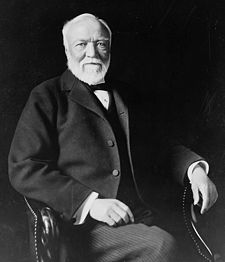The Andrew Carnegie of our second gilded age


Unlike Andrew Carnegie, whose career his most approximates, he was not born poor. He is a scion of moderate wealth, a lawyer's son. But like Carnegie, he rejected his father's path, famously co-founding Micro-Soft as a Harvard drop-out.
Again like Carnegie, Gates had one great idea. Carnegie's was integrated steel production. Gates' might be called integrated software production, starting with control of its base, the operating system, building dominant applications on top.
Like everyone else I have some fond memories of Gates' rise. At an early Dvorak party, drinking tea, surrounded, but intensely curious on the talk around him. At a later Comdex, driving a hand truck, autographing the "very late" copies of Windows 1.0.
Later he became a brand. By the 1990s old stories of Sam Walton were being rewritten for him. Gates insisting on flying coach, laughing at the extravagance of Wall Street.
It's enough money to build many hospitals, many universities, enough to build grand cultural institutions. So far, Gates seems most dedicated to inoculating poor children and creating a new model of "entrepreneurial philanthropy," building institutions that can survive on their own.
And he's moving onto my beat, with open source science. Demanding that medical researchers pool their findings before they get the money they need to proceed is highly audacious.
We haven't heard the last from Bill Gates. I'm glad I'm still at my desk to cover the rest of the story. I'm hoping it will be even better than the first part.